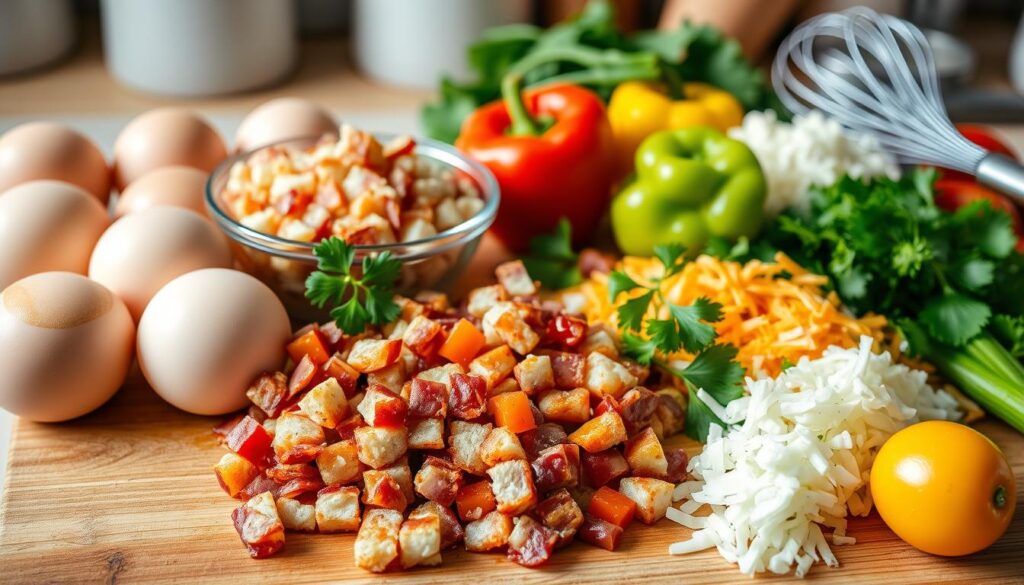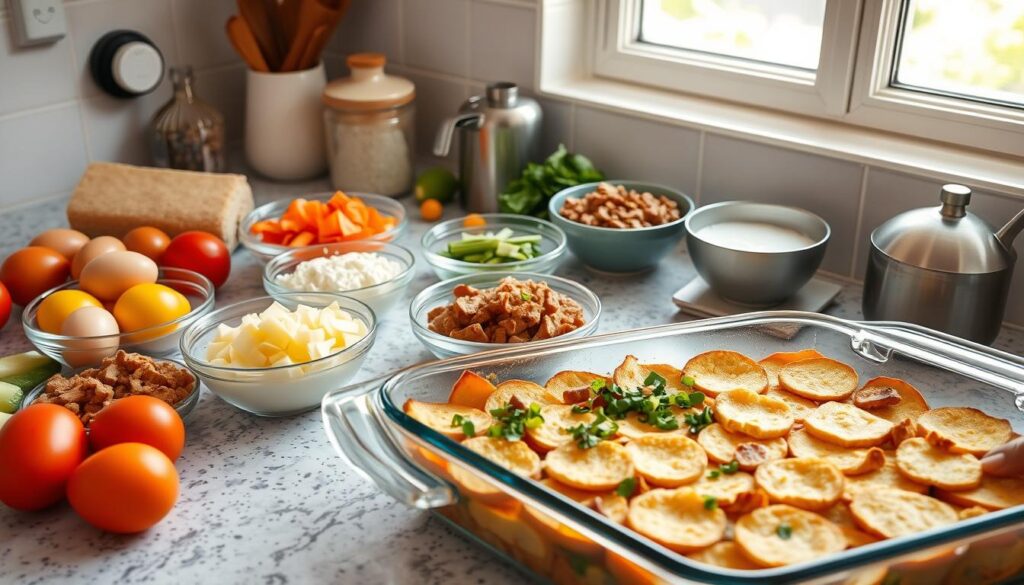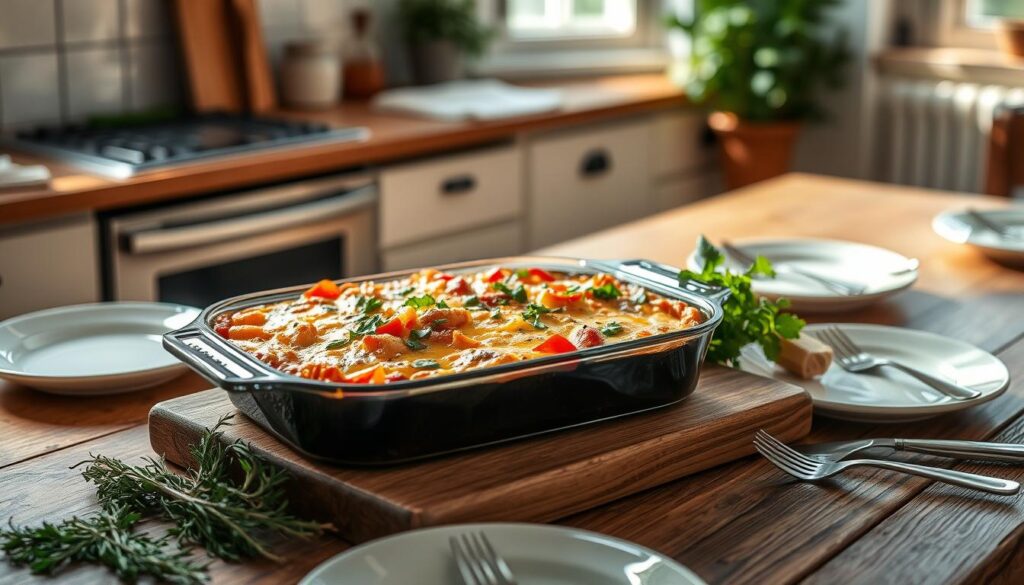Imagine waking up to a delicious breakfast casserole without the morning rush. Weekend brunches just got easier with these make-ahead breakfast casserole recipes. They will transform your morning routine.
A breakfast casserole is your secret weapon for stress-free entertaining. It’s perfect for large gatherings, serving up to 12 people. With just 20 minutes of prep and 45 minutes of cooking, you’ll impress everyone at the table.
The beauty of an egg casserole lies in its flexibility. Whether you’re hosting a family reunion or planning a casual weekend brunch, this dish adapts to your needs. Prepare it the night before, refrigerate, and bake fresh in the morning – it’s that simple!
From hearty pork sausage to vegetarian options, these casseroles offer something for every taste. With versatile ingredients like eggs, cheese, and your favorite mix-ins, you’ll create a memorable meal. Everyone will be coming back for seconds.
Get ready to discover the ultimate make-ahead breakfast solution that will revolutionize your weekend cooking. Let’s dive into the world of delicious, convenient breakfast casseroles!
The Ultimate Guide to Make-Ahead Breakfast Casseroles
Breakfast doesn’t have to be a morning rush. Make-ahead meals are changing how busy families start their day. An overnight casserole can be your secret to stress-free mornings and tasty meals.
Benefits of Preparing Breakfast Ahead
Preparing breakfast in advance has many benefits for home cooks. Here are some key advantages:
- 60% of overnight guests prefer make-ahead breakfast options
- Saves precious morning preparation time
- Reduces kitchen stress during busy weekends
- Allows for more family time before the day begins
Time-Saving Morning Solutions
A time-saving breakfast strategy can change your morning routine. With just 20-30 minutes of prep, you can make a meal for 8-10 people. Imagine waking up to a ready-to-go dish that needs little effort!
Perfect for Special Occasions
Breakfast casseroles are great for holiday gatherings or weekend brunches. About 75% of people make breakfast dishes in advance for special events. These dishes can be tailored to fit different tastes and ingredients.
Pro tip: For the best taste, refrigerate your overnight casserole for up to 24 hours before baking. This lets flavors mix well and ensures a delicious breakfast.
Essential Ingredients for the Perfect Breakfast Casserole

Making a tasty breakfast casserole begins with the right ingredients. Your casserole base needs ingredients that blend well for a delicious morning meal. Start with fresh, quality ingredients for the best egg casserole.
Here are the key ingredients you’ll need:
- Eggs: The main ingredient. You’ll need 12 large eggs for a creamy base
- Dairy: Add 1 cup of sour cream and 1/4 cup of milk for moisture and richness
- Cheese: Use 2 cups of shredded cheddar cheese for flavor and texture
- Proteins: Choose 2 pounds of pork sausage or other meats like bacon or ham
- Vegetables: Add 4 green onions, 1/2 green bell pepper, and 1/2 red bell pepper for color and nutrition
When picking your ingredients, think about flavor and texture balance. Fresh veggies add crunch and nutrients. Proteins give it substance. Aim for a mix that pleases your taste buds.
Here are some tips for your casserole base:
- For better absorption, use day-old bread.
- Sauté mushrooms to reduce their moisture content.
- Experiment with different types of cheese for unique flavors.
- Season generously with salt and pepper for the perfect taste.
Your breakfast casserole can feed 12-15 people, great for family meals or brunches. With the right ingredients and methods, you’ll make a meal everyone will remember.
Basic Components of a Successful Make-Ahead Casserole
Making a tasty breakfast casserole starts with picking the right ingredients. The right mix can turn a simple dish into a masterpiece. It’s all about choosing ingredients that complement each other well.
Protein Options and Combinations
There are many great protein choices for your casserole. Here are some top picks:
- Italian sausage (454 grams recommended)
- Crispy bacon pieces
- Cubed ham (1-2 cups)
- Vegetarian alternatives like tofu crumbles
Vegetable Mix-ins and Alternatives
Adding veggies can boost your casserole’s taste and health. Here are some favorites:
- Sweet bell peppers (1 cup diced)
- Spinach (0.5 cup frozen, well-drained)
- Mushrooms (8 ounces sliced)
- Kale or zucchini for variety
Cheese and Dairy Selections
Cheese can change your casserole’s flavor and texture. Try these options:
- Sharp cheddar (2 cups recommended)
- Pepper jack for added spice
- Feta for a tangy twist
- Smoked gouda for depth of flavor
Make sure to balance your ingredients. Aim for 10 eggs and 2 cups of milk for a great custard base.
Step-by-Step Assembly Instructions

Making the perfect breakfast casserole needs careful layering. Start by picking the right baking dish and getting your ingredients ready step by step.
- Grease a 9×13 inch baking dish thoroughly
- Cube bread or prepare potato base evenly across the bottom
- Cook and drain meat (sausage or bacon works best)
- Sauté vegetables like bell peppers and onions
- Spread cooked meat and vegetables over bread layer
For the egg mixture, whisk 6 large eggs with 2 cups of milk. Pro tip: Add 1 teaspoon of salt and 1/2 teaspoon of black pepper for enhanced flavor. Pour this mixture slowly and evenly across your layered ingredients.
Sprinkle 2 cups of shredded cheddar cheese on top. This final layer adds delicious richness to your casserole. You can prepare this dish ahead of time and refrigerate overnight, which allows flavors to meld beautifully.
When you’re ready to bake, preheat your oven to 350°F. Cover the casserole with foil and bake for 45-50 minutes. Remove the foil for the last 10-15 minutes to achieve a golden, crispy top.
Storage and Make-Ahead Tips
Breakfast casseroles are great for busy mornings and meal planning. Knowing how to store and reheat them makes mealtime easier. Let’s explore the best ways to prepare, store, and reheat your favorite breakfast dish.
Refrigeration Guidelines
Preparing your breakfast casserole ahead of time offers several storage options. An unbaked casserole can stay in the fridge for up to 24 hours before baking. Here are some key steps for storing your casserole:
- Cover the casserole tightly with plastic wrap
- Store in the coldest part of your refrigerator
- Ensure the dish is sealed to prevent moisture loss
Freezing Methods for Breakfast Casserole
Freezing breakfast casserole is a great way to prepare meals in advance. You can freeze an unbaked casserole for up to 2 months with the right preparation:
- Wrap the casserole tightly with plastic wrap
- Add a layer of aluminum foil for extra protection
- Label the dish with the date of preparation
- Store in the freezer flat to maintain even texture
Reheating Tips
Proper reheating is key to keeping your breakfast casserole delicious. Follow these tips for the best results:
- Thaw frozen casserole overnight in the refrigerator
- Preheat oven to 350°F (177°C)
- Cover with foil to prevent excessive browning
- Reheat for approximately 20-25 minutes until heated through
Pro tip: Always check the internal temperature reaches 165°F to ensure food safety. With these storage and reheating techniques, you can enjoy a delicious breakfast casserole anytime!
Breakfast Casserole Variations and Customizations
Exploring casserole variations opens up a world of delicious breakfast possibilities! With over 50 different bake-and-take casserole styles, you can transform your morning meal from ordinary to extraordinary. Customizing breakfast casserole recipes allows you to cater to different tastes, dietary needs, and ingredient preferences.
Here are some exciting ways to adapt your breakfast casserole:
- Bread Base Options:
- Sourdough for tangy flavor
- Croissants for buttery richness
- Gluten-free bread or potato bases
- Brioche for a luxurious texture
- Dietary Adaptations:
- Vegetarian versions with extra vegetables
- Low-carb options using cauliflower base
- Protein-packed alternatives with added lean meats
Sweet lovers can rejoice! Approximately 20-30% of breakfast enthusiasts enjoy sweet casserole variations like baked French toast or pancake-style casseroles. Try incorporating fruits such as blueberries, apples, or peaches to add natural sweetness and nutrition.
For savory enthusiasts, cheese appears in over 70% of casserole recipes. Experiment with different cheese combinations like sharp cheddar, mozzarella, or goat cheese. Add herbs like rosemary, thyme, or Italian seasoning to elevate the flavor profile.
Pro tip: When customizing your casserole, adjust liquid ratios if using very moist ingredients to maintain the perfect texture. Most casseroles can be prepared a day in advance, making meal prep a breeze for busy mornings.
Common Mistakes to Avoid When Preparing Breakfast Casseroles
Breakfast casseroles can be tricky, even for experienced cooks. Knowing how to avoid common mistakes is key. With the right tips, you’ll make dishes that wow everyone.
Start by understanding the basics of casserole making. Knowing these can prevent your dish from going wrong.
Temperature Considerations
Temperature is very important for a good breakfast casserole. Bake at 350-375 degrees Fahrenheit. Baking too hot can dry out the edges and leave the center raw.
- Use an instant-read thermometer to check internal temperature
- Aim for a minimum safe temperature of 165 degrees Fahrenheit
- Cover with foil for the first half of cooking to retain moisture
Ingredient Ratios
Getting the right mix of ingredients is essential. Moist ingredients like veggies and eggs can make or break your casserole.
- Drain frozen vegetables thoroughly
- Par-cook vegetables to reduce excess water
- Salt and drain watery vegetables like zucchini before adding
Texture Management
Getting the right texture is all about preparation. Stale bread is best for soaking up egg mixtures. Pre-cooking some ingredients helps avoid mushy parts.
- Chop ingredients into uniform sizes
- Pre-cook meats and hard vegetables
- Allow casserole to rest 15-20 minutes after baking
By following these tips, you’ll improve your breakfast casserole skills. Your morning meals will be unforgettable.
Serving Suggestions and Complementary Sides
Creating the perfect breakfast casserole experience is more than just the main dish. Your brunch pairings can turn a simple meal into a memorable event. Try adding different breakfast casserole sides to make your meal exciting.
Fresh fruit is a great choice to balance out the richness of casseroles. A colorful fruit platter with:
- Seasonal berries
- Sliced oranges
- Chopped apples
- Grapefruit segments
For protein, consider these tasty options:
- Crispy bacon or turkey bacon
- Greek yogurt with honey
- Scrambled eggs
- Mini quiche bites
Adding sides like crusty bread, homemade biscuits, or quick breads can enhance your brunch. Pro tip: Make almond flour banana bread ahead of time to save morning stress.
Don’t forget about drinks! Coffee, mimosas, or fresh juice can make your breakfast casserole experience even better. They impress your guests and add to a well-rounded meal.
Conclusion
Breakfast casseroles are the perfect make-ahead breakfast solutions. They make your morning routine easier. Just 15 minutes of prep and an hour of baking can feed 4-6 people. Each serving has 18 grams of protein.
These casseroles are super flexible for home cooks. They’re great for family gatherings or easy entertaining. You can change up the protein, add different veggies, and adjust the seasonings. This way, you get a tasty, balanced meal that you’ll love.
What’s great about these casseroles is how simple and practical they are. Learning to make them can make your mornings less stressful. Plus, you’ll create meals that everyone will enjoy. Just remember to keep leftovers in an airtight container in the fridge for up to 4 days.
Try out these recipes and see how they can change your breakfast game. Your kitchen will become a place of delicious, stress-free breakfast ideas.

